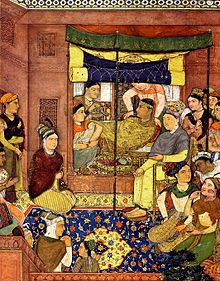Mariam-uz-Zamani
| Rajkumari Heer Kunwari | |
|---|---|
| Malikaye Marium uz Zamani Wali niyat Begum Sahiba | |

Artistic depiction of Heer Kunwari
|
|
| Reign | 6 February 1562 – 27 October 1605 |
| Born | 1 October 1542 Amer, India |
| Died | 19 May 1623 (aged 81) Agra, India |
| Burial | Tomb of Mariam-uz-Zamani, Agra |
| Consort | Akbar |
| Issue | Jahangir (1569-1627) |
| House | Kachwahas of Amer |
| Father | Raja Bharmal |
| Mother | Rani Sa Manvati Sahiba |
| Religion | Hinduism |
Mariam-uz-Zamani Begum (Persian: مریم الزمانی, lit. 'Mary of the Age'), (born c.October 1542 – died 19 May 1623), better known as "Jodha bai," was an Empress of the Mughal Empire and a wife of the Emperor Akbar. Her actual name was Heer Kunwari, Hira Kunwari or Harkha Bai, and she was also referred to as "Jodha Bai," which perhaps indicates that she was a princess of Jodhpur by birth (although mostly she is said to have been a princess of Amber). Mariam-uz-Zamani Begum was the respectful Persian title by which she was known at her husband's court. In India, it was considered disrespectful to refer to a well-born lady by her name, and this is the reason why her actual name is rather obscure, although she is known by at least two respectful sobriquets, being "Jodha Bai" according to Indian tradition and "Mariam-uz-Zamani" in the Persian style. She was the ancestor of every Mughal emperor beginning with her son, Jehangir.
Mariam-uz-Zamani was born as Harka Bai, a Rajput princess. According to some sources, she was the daughter of Raja Bihari Mal (or Bharmal) of Amber (Jaipur), whereas other historians infer that she was a princess of Jodhpur, because she is also known as "Jodha Bai." In 1562, while yet a teenager, she was given in marriage to the Emperor Akbar, who himself was only twenty years old. The wedding, held in Sambhar and intended to seal the friendship between her father and husband, is notable for having been the first instance of matrimony between the Hindu aristocracy of India and a Muslim ruler of Delhi, although much of northern India had been ruled for over 500 years by a succession of Muslim dynasties. Her marriage to Akbar led to a gradual shift in his religious and social policy. Akbar's marriage with Rajkumari Heer Kunwari was a very important event in Mughal history. She is widely regarded in modern Indian historiography as exemplifying Akbar's and the Mughal's tolerance of religious differences and their inclusive policies within an expanding multi-ethnic and multi-denominational empire.
...
Wikipedia
